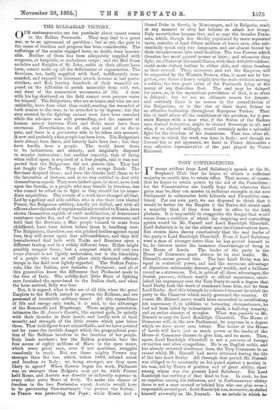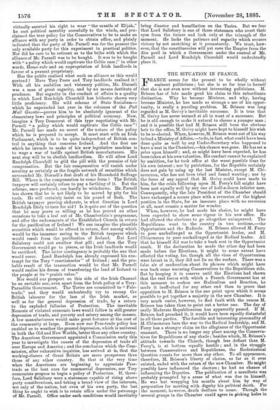TORY CONTINGENCIES.
IT seems evident from Lord Salisbury's speech at the St. Stephen's Club that he hopes to obtain a sufficient majority to enable him to retain office. That means, of course, that he hopes to retain power by the aid of the Parnellites ; for the Conservatives can hardly hope that, whatever their gains may be, they can muster in sufficient strength in the new Parliament to outnumber both Liberals and Parnellites com- bined. For our own part, we are disposed to think that it would be better for the Empire if the Tories did obtain such a majority than if they were kept in office by the Irish phalanx. It is impossible to exaggerate the danger that would ensue from a coalition of which the inspiring and controlling spirits would be Mr. Parnell and Lord Randolph Churchill. Lord Salisbury is by far the ablest man the Conservatives have. But events have shown conclusively that the real leader of the party is Lord Randolph Churchill. Even if Lord Salisbury were a man of stronger nerve than he has proved himself to be, he labours under the immense disadvantage of being in the House of Lords. The leader of the party in the House of Commons must always be its real leader. Mr. Disraeli's career proved this. The late Lord Derby was his equal in oratorical power, and had the enormous advantage of illustrious aristocratic descent, great wealth, and a brilliant record as a statesman. Yet, in spite of all these advantages, the Jewish parvenu, without wealth or official experience, estab- lished his supremacy over the Tory Party to such a degree that Lord Derby took the word of command from him, not he from Lord Derby. And this triumph he achieved because he ruled the party in the Chamber which really governed the country. Of course Mr. Disraeli never would have succeeded in establishing his supremacy if, in addition to favouring circumstances, he had not been aided by indomitable pluck, a bull-dog tenacity, and an entire absence of scruples. What was possible to Mr. Disraeli is easy for Lord Randolph Churchill. The House of Commons will, in the new Parliament, be supreme in a degree which we have never seen before. The leader of the House of Lords will have just as much power as the leader of the House of Commons chooses to give him, and no more. Then, again, Lord Randolph Churchill is not a parvenu of foreign extraction and alien sympathies. He is an English noble, and has already extorted obedience from the Tory Commons to an extent which Mr. Disraeli had never obtained during the life of the late Lord Derby. All through that period Mr. Disraeli was obliged to be constantly on his guard against a mutiny in his rear, led by Tories of position and of great ability, chief among whom was the present Lord Salisbury. But Lord Randolph has nothing of that kind to fear. In rank, he has no superior among his followers, and in Parliamentary ability there is not a man around or behind him who can play even a respectable second part. Lord Randolph bas,moreover, modelled himself avowedly on Mr. Disraeli. In an article in which lws virtually asserted his right to wear "the mantle of Elijah," he cast political morality scornfully to the winds, and pro- claimed the true policy for the Conservatives to be to make an alliance with any \party in order to obtain office, and plainly indicated that the party of Mr. Parnell was for the present the only available party for this experiment in practical politics. Nor did he care to be reticent as to the bribe with which the alliance of Mr. Parnell was to be bought. It was to be bought with " a policy which would captivate the Celtic race ;" in other words, Home-rule and an expropriation of Irish landlords in favour of a peasant proprietary. - Has the public realised what such an alliance as this would portend ? Have Tory Peers and Tory landlords realised it ? With all his ambition and visionary politics, Mr. Disraeli was a man of great sagacity, and by no means destitute of prudence. But sagacity in the conduct of affairs is a quality in which Lord Randolph Churchill has hitherto shown very little proficiency. His wild scheme of State Socialism— which he expounded last year in the columns of the Pall Mall Gazette—proves him to be absolutely ignorant of the elementary laws and principles of political economy. Now, imagine a Tory Democrat of this type negotiating with Mr. Parnell " a policy which would captivate the Celtic race"! Mr. Parnell has made no secret of the nature of the policy which he is prepared to accept. It must start with an Irish Parliament, which is to be quite independent of British con- trol in anything that concerns Ireland. And the first use which he intends to make of his new legislative machine is to wage a war of tariffs against British manufacturers. His next step will be to abolish landlordism. He will allow Lord Randolph Churchill to gild the pill with the promise of fair compensation. But the fair compensation will vanish under scrutiny as certainly as the fragile network of securities which surrounded Mr. Disraeli's first draft of his Household Suffrage Bill. Where is the compensation to come from ? The British taxpayer will certainly refuse to pay a farthing of it. But the scheme, once produced, can hardly be withdrawn. Mr. Parnell has shown that he is not likely to be moved by pity for his tools. He will certainly insist on his pound of flesh. The British taxpayer proving obdurate, in what direction is Lord Randolph likely to turn for aid? Is it quite out of the question that he may prove as willing as he has proved on other occasions to take a leaf out of Mr. Chamberlain's programme, and offer the endowments of the Established Church in return for the pacification of Ireland ? We can imagine the plausible securities which would be offered in return, first among which would be the immense saving to the British taxpayer which would result from the pacification of Ireland. But Lord Salisbury could not swallow that pill ; and then the Tory Government would go to pieces, or the Irish landlords would be sacrificed. The latter contingency is probably the one that would occur. Lord Randolph has already expressed his con- tempt for the Tory " reactionaries" of Ireland ; and the pro- bable result of the transaction would be that Mr. Parnell would realise his dream of transferring the land of Ireland to the people at its " prairie value."
Nor would our prospect on this side of the Irish Channel be an enviable one, even apart from the Irish policy of a Tory- Parnellite Government. The Tories are committed to " Fair- trade," and they would undoubtedly try to recoup the British labourer for the loss of the Irish market, as well as for the general depression of trade, by a return to the exploded fallacies of Protection. The inevitable Nemesis of violated economic laws would follow in still greater depression of trade, and poverty and misery among the masses.
A few manufacturers would make great fortunes at the cost of the community at large. Even now our Free-trade policy has enabled us to weather the general depression, which is universal in both the Old and New Worlds, better than any other country.
The American Government appointed a Commission early this year to investigate the causes of the depression of trade all over Europe and America ; and the conclusion which the Com- mission, after exhaustive inquiries, has arrived at is, that the working-classes of Great Britain are more prosperous than those of any other country. So that at the very time when the Americans are beginning to appreciate Free- trade as the best cure for commercial depression, our Tory economists propose to begin a policy of Protection. If, there- fore, Lord Salisbury were a statesman capable of rising above party considerations, and taking a broad view of the interests, not only of the nation, but even of his own party, the last thing he ought to wish is to retain office under the patronage of Mr. Parnell. Office under such conditions would inevitably bring disaster and humiliation on the Tories. But we fear that Lord Salisbury is one of those statesmen who avert their eyes from the future and look only at the triumph of the moment. He lacks the patience and sagacity which secures victory by not snatching at it prematurely. We trust, how- ever, that the constituencies will yet save the Empire from the dire peril in which a Government under the control of Mr. Parnell and Lord Randolph Churchill would undoubtedly place it.



































 Previous page
Previous page